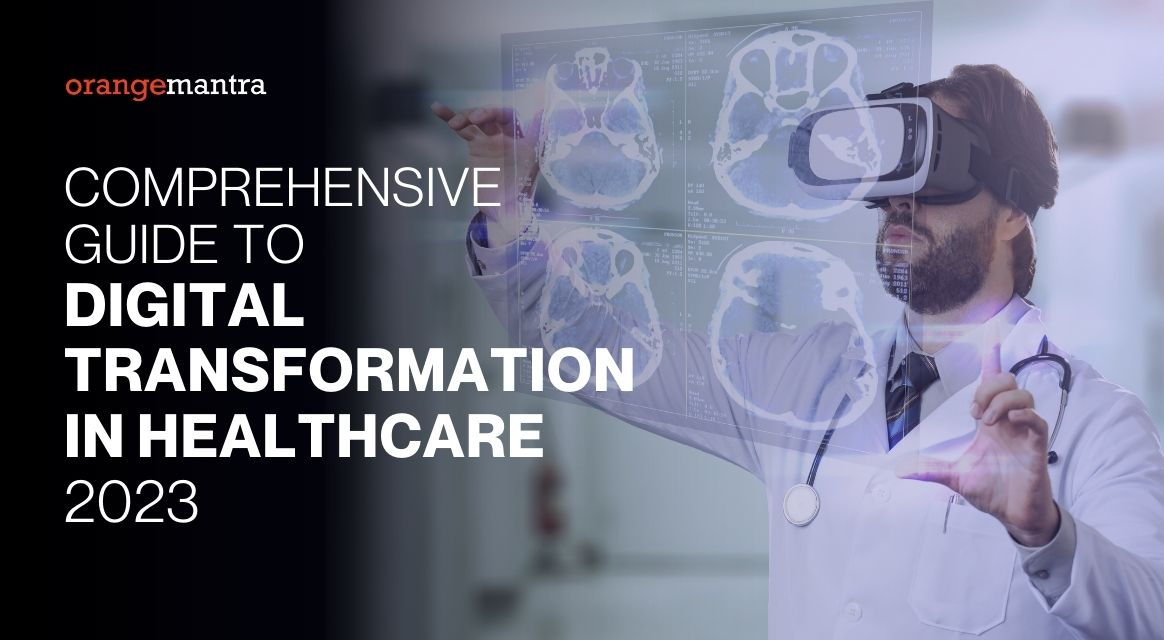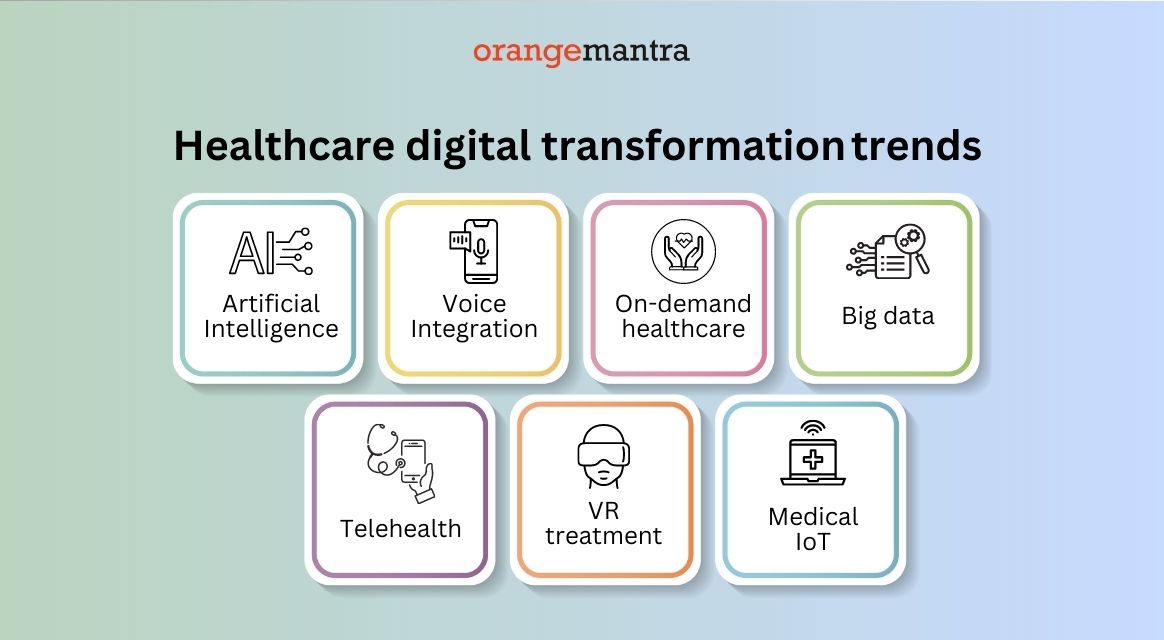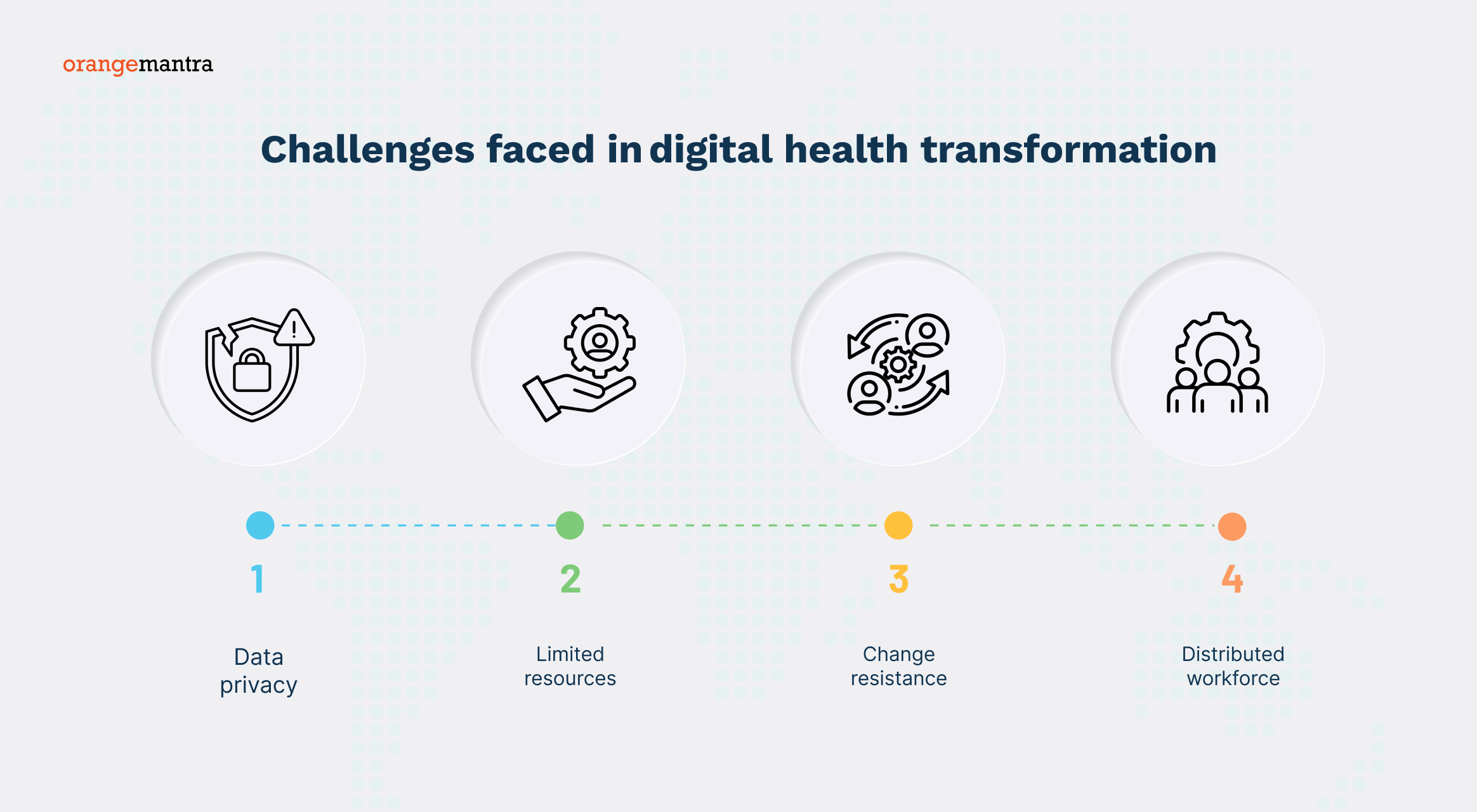
Here’s what you will learn:
Technology advances have already played a powerful success-driving force. And just like other sectors, healthcare has also invited these changes as a part of growth. In the coming years, the industries will surge to the top. So, digital transformation in healthcare is quite significant to notice. And if you want to know how it will impact the future, let’s dive in.
Table of Contents
An overview of digital transformation in healthcare
The healthcare sector has encompassed many tech-related innovations. And the digital transformation in healthcare industries utilized modular solutions. Such as patient care, drug discovery, streamlined operations, etc. Technological inventions have made the medical experience of patients smoother. And this advanced integration has helped the patients to consult the experts.
The process to develop a digital healthcare app
Here are some guided steps to develop a healthcare app.
1- Research legacy system
Carefully look at what you have in the existing system. Such as legacy or real-time data, patient records, etc. And when you have all the required data you can easily know what you want. Plus, it gives you an overview of how digital transformation in healthcare will transform your business. Even you will figure out how you will improve the existing data. Moreover, look at the system data you will understand what you need.
2- Conduct needs assessments
After you have got all the data try to collaborate with other teams as well. So, by keeping the budget in mind engage with teams to discuss the budget. Now assess the crucial indicators you need for the application. Such as HCAHPS scores, ROI, patient safety, etc. Moreover, integrate strategies to achieve high performance via healthcare software solutions.
3- Build the roadmap
Now comes the foundation of healthcare apps. The users, because of their satisfaction make or break the app. So, you need to design and build the complete user roadmap. Because when the map the user experience it will let you see the opportunities and the roadblock. So, it helps to move forward to clarify any misinterpretations too.
4- Faster deployment
You can finally deploy the healthcare IT solutions after successful development. You can consult a healthcare app development company for more assistance. Because when you work with an exceptional partner, you get the necessary skills. Furthermore, their experience will aid in tracking progress, sharing vision, and so on. Furthermore, you must work with a reputable agency to complete the projects.
5- Ongoing support
So, after the successful launch of the healthcare application. Check if you get the maintenance and support services. Digital transformation in healthcare will offer the sector with future-ready advancements. Plus, you get the necessary expertise and skills from the service provider. Discuss the services you get after the collaboration. Because you need a reliable partner to digitize your healthcare solutions.
Healthcare digital transformation trends
Here are some latest tech trends your healthcare app should keep up with
1- On-demand healthcare
With the new tech evolutions on-demand healthcare apps have seen a drastic rise. Users want the on-demand app as a digital transformation in healthcare to serve urgency. As the number of patients increases, so does the demand to create the application. This trend is not just user-friendly but also benefits businesses. Experts can directly connect with the patients. And that too depends on their availability.
2- Big data
Another potential technology is Big Data which will exponentially grow. By leveraging this technology the healthcare industry can work with millions of data. As we know the big data market will grow with time and increased demands. Moreover, the potential technology has the potential to create insights. And that too from unstructured and structured data formats.
3- Fewer errors
Big Data is a potentially useful technology for filtering out or flagging inconsistencies. Such as patient health information and medication prescriptions. Furthermore, healthcare IT solutions assist both professionals and patients in avoiding serious errors.
4- Accurate staffing
Big Data also helps to inform hospitals about the patient’s admission via predictive analysis. So, it can help staff get the advanced facilities to address the patients.
5- Informed planning
Big Data helps professionals to get the patient’s previous records. Because they get the proper analysis of the health condition from healthcare software solutions. Plus, they can also determine what’s stopping them to seek help. So, these things are used for planned strategy making.
Also Read: Top Challenges Facing Big Data Analytics in Healthcare
6- VR treatment
AR/VR is not just to offer a seamless shopping experience. It also became the potential technology to support the healthcare sector. Plus, it offers great help the individuals with chronic diseases. Even some regions struggle to offer such future-ready assistance.
This technology integration offers comfort to the users with streamlined checkups. Even it checks for stress, strokes, PTSD, and more in-depth checks. Doctors and patients are well aware of the VR simulations to integrate strategies. Because it can even address complex surgeries for precision work. And we can assume the AR/VR market will surge in the coming years.
7- Medical IoT
IoT has a strong potential to take every sector to heights. And now, IoT in healthcare is here to help the sector to grow at a rapid pace. So, the new term coined Medical IoT for digital transformation in healthcare industries. Even it helps to serve many complex solutions.
So, these all factors contribute to making the institution a bit smarter. And it also contributes to making excellent experience, patient care, and efficiency. You can consult a healthcare software solutions provider for more assistance.
8- Voice integration
Voice or image integrations were a big thing in previous years. But the integration is gaining quite a popularity. Moreover, the healthcare sector is wholeheartedly welcoming the technology. Because digital health transformation helps professionals to streamline their workload. Voice and commands are making big names in the EHR platforms. It helps the healthcare IT solutions sector with clinical intelligence and task efficiency. Plus, it also saves time and money to add multiple features.
9- Artificial Intelligence
When talking of so many technologies, AI will never lag. Because the digital transformation in healthcare will never be complete with AI. Even the global trends of AI will rise in the coming years. So, the application of AI can help the sector. Such as drug discovery, medical imaging, precision medicine, etc. AI development solutions help to analyze even complex medical issues like Cancer or strokes.
Even they suggest an anti-cancer drug to heal their conditions. The integration of AI in health care helps to revolutionize the sector to enhance the experience. Such as diagnosis accuracy, improve patient care, and increase efficiency. AI gets integrated with chatbots and other tech products for more assistance.
10- Telehealth
Telemedicine or mHealth apps are one of the major offerings that patients appreciate. As telehealth is here to offer strong interaction between experts and patients. It offers a new way to reach out to help in urgency. Such as video consulting, remote monitoring, etc. And the use of this telehealth helped many remote patients. Because it eliminated the unwanted distance to connect with experts. Telehealth integrated with IoT devices will offer huge opportunities to track their activities.
Challenges faced in digital health transformation
Here are the most crucial challenges faced by the healthcare sector.
1- Data privacy
The leap toward digital transformation offers several digital data leaks. Because online hackers can easily access confidential data. So, the need for privacy protocols to secure patient records. As this also protects your healthcare IT solutions from any unwanted access.
2- Limited resources
Just creating the medical app won’t do the best for the users. So, many medical apps lack the proper resource facility. Because they may not have the budget, expertise, or tech stack to integrate. But to embrace digital transformation in healthcare needs all of it.
3- Change resistance
There are many cases where healthcare professionals refuse to upgrade. Because they feel the traditional methods will do the best patient care. But the use of innovative technologies will benefit the management.
4- Distributed workforce
New tech trends have helped the healthcare industry dynamic for use. So, the mandatory shift the digital health strategies to fight against unauthorized access. And to improve the management you should have a bridge to connect the experts and the patients.
Conclusion
The healthcare sector has brought up technology integration to support its users. Plus, it offers incredible use to medical experts. And the above-mentioned pointers will help you learn a lot about it. For more consideration, consult healthcare software solutions provider for your projects.
FAQs
1- What impact does digital transformation have on healthcare?
Cost-cutting measures. Increasing administrative costs and overheads force healthcare organizations to raise patient care service fees.
2- What do you need to know about healthcare digital transformation?
The integration of technology with healthcare systems to provide better patient care, improve staff experience, reduce costs, optimize operational processes, enable faster diagnoses and drive efficiency is known as digital transformation in healthcare.
3- What are the five essential components of a successful digital transformation?
- Pre-planning.
- Resourcing.
- Visioning in business.
- Define and limit the scope of the project.
- Data transfer.




